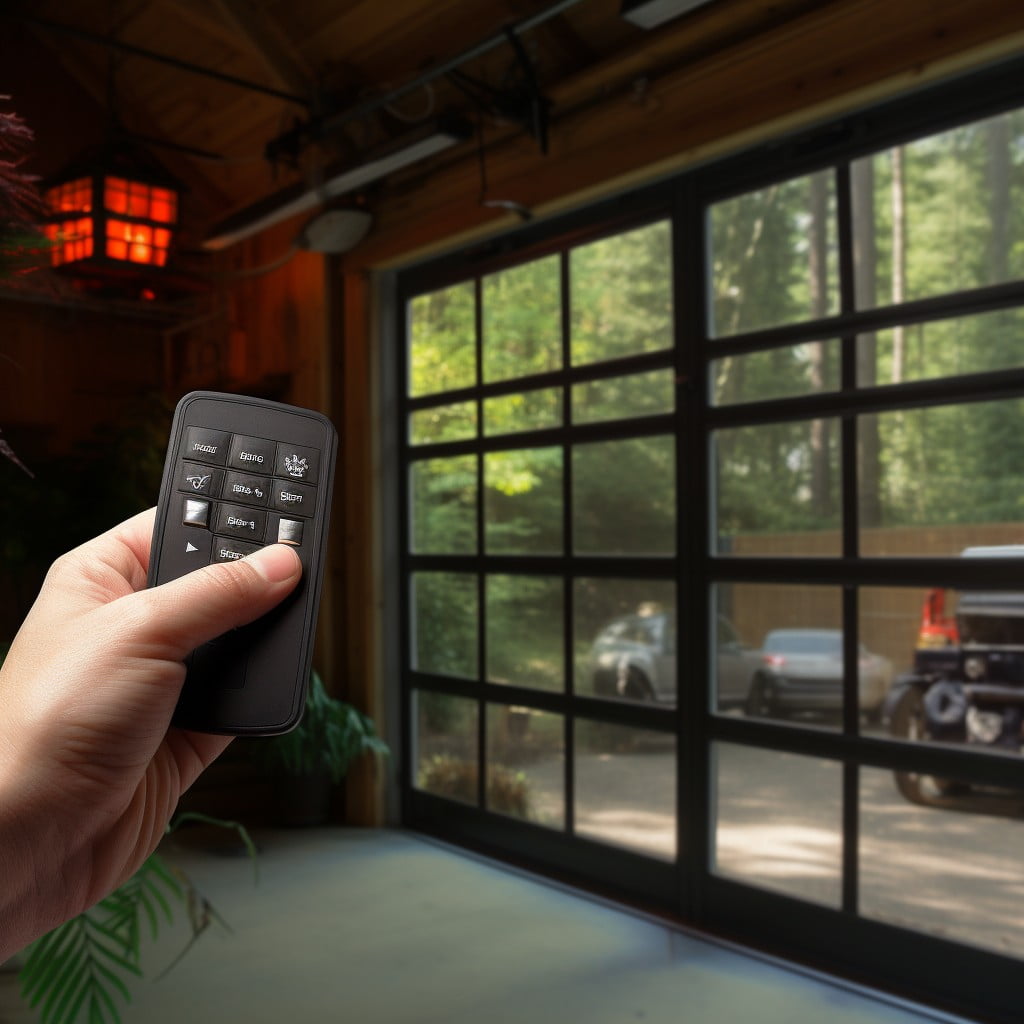Yes, someone can potentially copy your garage door opener if they have access to it and the necessary technical expertise.
Yes, it is possible for someone to copy your garage door opener, but it’s not as simple as it sounds. This process, known as “code grabbing,” involves intercepting the signal your remote sends to your garage door opener.
While it may sound alarming, modern garage door systems have security features in place to prevent this. However, older models may still be vulnerable.
In this article, we will delve deeper into how garage door openers can be copied, the risks associated with this, and most importantly, how you can protect your garage from unauthorized access.
Stay tuned to get a comprehensive understanding of the issue and its solutions.
Key takeaways:
- Code grabbing is a risk for fixed code garage door openers.
- Rolling code openers can be vulnerable to replay attacks.
- Keypads can be hacked through code grabbing or shoulder surfing.
- Cloning a garage door remote is possible but more difficult with rolling codes.
- Upgrading to a rolling code opener and practicing good security habits can protect against unauthorized access.
Security Risks of Fixed Code Garage Door Openers

Fixed code systems are a standard technology for some older garage door openers. They operate using a single, unchanging code transmitted between the remote and the receiver to lift or lower the door.
1. Code Grabbing: Criminals can capture the fixed code with devices known as “code grabbers“. Once they pick up the signal, they can duplicate it to open the door themselves.
2. Limited Security: As there is only one code in use at any given time, once a malicious party uncovers it, they can continually gain access until the code is manually changed.
3. Tech Advancements: With the evolution of technology, decoding a fixed signal is easier now. Sophisticated gadgets are available to anyone, enhancing the potential for security breaches.
For these reasons, fixed code systems are considered less secure compared to their advanced counterparts.
Hacking Risks Associated With Rolling Code Garage Door Openers

While a significant improvement from their fixed code predecessors, rolling code garage door openers are not devoid of potential security vulnerabilities. They work on the principle of changing codes each time the opener is used, intended to prevent unauthorized access. However, tech-savvy invaders employing advanced code-grabbing devices can exploit a loophole named the “replay attack.”
In a replay attack, the hacker intercepts the code during transmission and reserves it for later use. The entire process demands precise timing and proximity, reducing the likelihood but not eliminating the possibility. Additionally, some opportunistic thieves use a technique called “jamming” to block the signal of your remote while recording the transmitted code.
Modern garage door openers often come equipped with sophisticated encryption methods and anti-replay attack features to thwart these hacking techniques. Regular software updates are also crucial in maintaining your garage security system’s efficacy against potential threats.
Furthermore, ensuring your remote is not easily accessible or visible can provide an added layer of security, discouraging potential threats from attempting a breach.
The Possibility of Garage Door Keypad Hacking

While relatively safe, keypads aren’t immune to hacking. Some unauthorized users might try the common approach of identifying commonly used codes, known as ‘code grabbing’. Another tactic includes ‘shoulder surfing’, where the hacker observes your entries from a hidden location.
High-tech enthusiasts might employ advanced methods, like ‘man-in-the-middle’ attacks, intercepting the code when it’s transmitted from your keypad to the opener.
To mitigate such security risks, it’s advisable to frequently change your code. Avoid predictable or commonly used combinations, and ensure the pad is covered or out of sight from potential onlookers.
For a robust security posture, consider investing in keypad models that feature rolling-code technology to reduce the risk of code interception.
The Process of Cloning a Garage Door Remote

In the world of tech, the possibility of cloning is a reality and extends even to garage door remotes. The process typically involves a device known as a “remote clone,” which works by receiving the signal from the original remote and replicating it.
Here’s a simplified breakdown:
- The clone device gets activated – this prepares it to receive the remote signal.
- It’s placed near the original remote, the goal is for the clone to capture the transmission signal of the original remote.
- The original remote’s button is pressed within range of the clone. This sends out a signal that the clone captures.
- The clone now stores this information. Consequently, when the button on the clone device is pressed, it replicates the original signal.
Note that this simplistic explanation applies mostly to older garage door remotes with fixed codes. More advanced remotes with rolling codes present a significant challenge, as the transmitted signal changes every time the remote is used.
Consequences and Risks of a Stolen Garage Door Remote
Should your remote fall into the wrong hands, it presents a glaring security risk. The thief, without a doubt, will have unhindered access to your garage, and consequently, your home. This opens the door to a series of potential problems, from theft and vandalism to personal safety concerns.
By having your garage door remote, the intruder bypasses the need for technical know-how to open your garage. With just a press of a button, they can easily gain access to your home. The most worrying thing is that this breach of your home security occurs without leaving visible signs of a break-in, which may delay your detection and response.
Secondly, a stolen door opener makes your home a soft target for repeat burglaries. Once the intruder knows they can access your home easily, they might exploit this weakness repeatedly, which can lead to devastating losses.
Additionally, this security breach could potentially escalate personal safety threats. An open garage door not only threatens the safety of your belongings but also of your family. As such, if you’ve lost your garage door remote or it was stolen, it’s crucial to act swiftly to mitigate these risks.
Understanding the Security+2.0 Garage Door Opener Technology
Security+2.0 is an advanced technology that offers superior protection for your garage. This technology utilizes a new code with each click of the remote. This approach ends the potential for code grabbing, where hackers get your garage’s signal and reproduce it.
Not only does it generate a new code every time, but it also offers a massive number of combinations — over a billion. This staggering variety makes it nearly impossible for even the most dedicated hackers to guess your code.
Also worth noting is the inclusion of multi-frequency performance. With it, your garage door overrides common frequency interferences ensuring consistent performance.
In a nutshell, this technology is a leap towards maximum safety and minimum worries about garage door security.
How to Protect Your Garage Door Opener From Unauthorized Access
To increase the security of your garage door opener, consider upgrading to a model that uses a rolling code technology, which changes the code after each use to make cloning almost impossible. Always keep the remote controls in a secure location to avoid theft.
Another safeguard is to install a lock on the garage door; a physical barrier can provide an added layer of security.
For advanced security, consider smart garage door openers. These models offer features such as smartphone controls, real-time alerts, and even video monitoring. They usually come with encryption technology, adding a robust layer of protection against hackers. Some models also offer two-factor authentication, an excellent feature for extra security.
Additionally, always keep the garage door maintenance up to date. Over time, doors, locks, and opener mechanisms can wear out and become easier to breach. Regular check-ups and prompt repairs can save you from unnoticed, slow-occurring security risks. Regularly change your access codes if your unit allows it, as this can help prevent unauthorized access.
Finally, consider installing a security system that includes your garage. Today’s security systems offer comprehensive protection covering all access points, usually paired with professional monitoring services. A good security system can be your last defense line and, at the same time, a potent deterrent for potential intruders.
FAQ
Can someone make a copy of your garage door opener?
Yes, someone can potentially make a copy of your garage door opener if they gain access to it, due to the "clone function" available in some universal garage door remotes.
When someone steals your garage door opener?
To secure your home when your garage door opener is stolen, erase the remote from the system's memory and reset the opener's code, thereby making the stolen device useless.
Can someone open a garage door without a remote?
Yes, it's possible to open a garage door without a remote by utilizing the manual cable release, typically operated via a small key, which disconnects the door from the opener chain.
How can you prevent duplicates of your garage door opener from being made?
To prevent duplicates of your garage door opener from being made, ensure the deactivation of the old remote control from the system, typically achieved through a button on the garage door opener or via a specific series of actions described in the unit's manual.
What security measures can be implemented to protect against stolen garage door openers?
To protect against stolen garage door openers, homeowners can switch to smart garage openers, regularly change their codes, and ensure the opener is not visible or accessible from outside the vehicle.
What options exist for garage doors that don't require traditional remotes?
Several options for garage doors that don't require traditional remotes include keypads, fingerprint scanners, smartphone apps, or Wi-Fi-enabled openers.